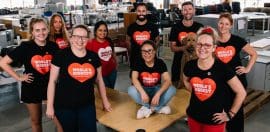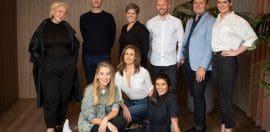Using mushrooms and waste to create a new take on plastic

25 January 2022 at 4:19 pm
Could the answer to eliminating single-use plastic and increasing the ease of carbon capture lie in the roots of the humble mushroom? A Melbourne-based start-up believes it could.
If you’re a conscious consumer you’re already more than aware of the catastrophic damage single-use plastic is having on the planet.
And while a lot of us are doing our bit with reusable coffee cups, glass water bottles, SodaStreams and wax wraps, when it comes to fully eliminating plastic from our packaging, well, that relies on the businesses we buy from.
The exponential rise in online shopping over the last two years has only underscored the urgent need for more sustainable packaging. Hands up if, during lockdowns, your home became a shameful pile of plastic bubble wrap and polystyrene. Yup, us too.
Recognising that unsustainable packaging was becoming a real problem was the starting point for Fungi Solutions, a team of three in Melbourne’s inner north who have been using mycelium, the vegetative part of a mushroom or fungus, to create a new kind of packing material.
Creating mycelium-based packaging uses just 12 per cent of the total energy required for plastic production with 90 per cent fewer carbon emissions. Plus, mycelium captures twice its weight in CO2 during the growing process.
From movies to mycelium
Amanda Morglund and Camden Cooke formed Fungi Solutions towards the end of 2020 with Emily Medbury coming on as creative director soon after.
An ex-fashion designer, Morglund had been experimenting with mycelium and recycled materials in clothing since 2016, however, it was a film she made with Medbury in 2019 called Mycelium Made that really got the ball rolling for Fungi Solutions.
After screening at the Environmental Film Festival and winning the Unscene Film Competition, the success of Medbury’s film gave Morglund the confidence she needed to work out how she could expand on her use, and knowledge, of mycelium.
She wanted to know how she could broaden its usage to create something bigger while also dealing with the huge amount of waste we, as humans, generate.
The power of mycelium and why it could be the next plastic
Medbury explains that mycelium is technically the root network of the fungi. If you imagine the little mushroom popping out of the ground, mycelium is what’s going on underneath the soil.
“Mycelium is like a structure of fine, white filaments that works as the digestive system of the fungi,” she says.
“It just moves along, eating everything in its path and what comes out at the end, once the mycelium has eaten its way through the waste, is a natural, organic material that looks like a natural version of polystyrene.”
Understanding this process formed the basis for Fungi Solutions and the products the business is now creating.
“Amanda and Camden first had this idea to create Fungi Solutions as an organic recycling facility, which would take waste from local businesses and use mycelium to break it down,” Medbury says.
“And then we thought about how we could then use the end product to create something new. The products we create at Fungi Solutions are basically like a replacement for polystyrene and foam. But rather than just being biodegradable, they are fully home compostable.”
At the moment, Fungi Solutions is focused on producing organic mycelium product boxes, acoustic panels, wine coolers and custom product displays.
The process from waste to product
The process to create a mycelium product is, as you can imagine, a lengthy one. The waste the team uses is essentially made up of cigarette butts, agricultural waste and starter culture, which is then packed into 3D printed moulds.
The moulds are then put into ‘grow rooms’ with climate control and the mycelium is left to do its thing.
“The material is then just left to grow,” Medbury says. “Once it’s ready we pull the finished product out of the mould, de-mold it (pull off any mushrooms etc), dry it out and it’s ready to go.”
Word of the start-up has spread among the sustainable business community, and Fungi Solutions now has a backlog of clients set to keep it busy until the end of the year.
With only three team members, plus a few people who come in and help out, Medbury says they know they need to scale up so they can grow. It’s the reason they’re getting ready to launch their EOI for a raise with Birchal, the crowd-funding platform, sometime in February.
Because the products aren’t being mass-produced, currently product orders need to be placed in units of 100 and the turnaround time is around a month – with the material taking around one to two weeks to grow. It’s a process Medbury says they hope to speed up once they’ve raised funds.
“We’re going for a $1.5 million raise with Birchal and that investment is going to help us streamline our process,” she says.
“We’ll then be able to take on more clients and bring out more products which then also means we can get rid of more waste and capture more carbon in the process.”
Find out more about Fungi Solutions here







